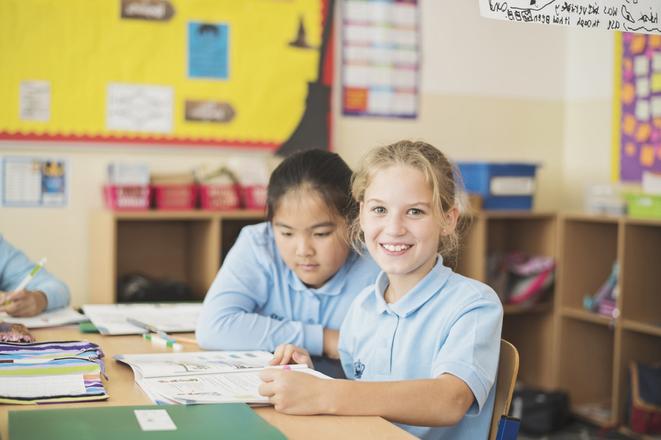The COVID 19 pandemic has brought with it a multitude of challenges, none more so than how to keep children learning despite them not being able to be in the actual school building. Technology has enabled teachers to connect with students remotely and to conduct lessons online using various platforms and apps that promise engaging content alongside interactive opportunities. However, the reality of online learning depends on a variety of conditions that often hinge on children’s mental state. Therefore, it is vital to address children’s wellbeing at all stages of virtual school to ensure that they stay motivated, keep learning and most importantly continue to thrive during these difficult times.
Here are 11 tips that we recommend parents try to maintain student and family wellbeing:
1. Create a routine
Routines are vital in creating clarity and certainty to the school day. We encourage children to approach each day as a normal school day, with a balanced schedule of lessons, time for relaxation, and some movement time built in. At the British International School Bratislava, student timetables have largely remained unchanged despite moving to virtual school. Teachers are live-streamed to all students during lessons.
2. Take a break
Encourage your child to often take short breaks to play, be active, or rest. Space and time away from their screens can help them refocus and reset for the next task. This is especially important at the end of the day. We encourage children and families to get outside where possible and take a proper break away from schoolwork and screens; any time in nature is particularly revitalizing.
3. Encourage independent study
Connecting and collaborating with other children is great for enabling independence – they can share ideas, tackle challenges, and work together as they would at school. For instance, at the British International School Bratislava, we facilitate group work through ‘channels’ in Teams. If children are struggling, parents can offer a lifeline by providing encouragement and support; this may be by giving them space, offering to help, or just suggesting that they take a break.
4. Reward hard work
It’s important to recognise and reward your child for their hard work and successes, so take time to share and celebrate together.
5. A comfortable workstation
Help your child to create a comfortable area where they’ll enjoy working – ideally with sunlight, fresh air, space to move around, and encourage them to keep it clean and tidy. A piece of research from Zagreb suggests that the best thing you can buy your child to improve study habits is a desk. BBC link.
6. It’s good to talk
Your child’s teachers are experts and are there to support your child. Encourage children to talk to education professionals at school, to ask for help, or to share any challenges or concerns. But also, the best learning happens when children try to teach someone else i.e. you! Really engage with your child by asking them to teach you something they have learnt. Educationalists have given this technique a name, ‘the protégé effect’.
7. Close connections
Encourage your child to interact with friends, as they would at school or in the evening. Create opportunities for them to socialise through phone calls, connecting on social media or the school’s platform, and meeting face-to-face when restrictions allow.
8. Do what you love
Ensure that your child spends ample time offline every day and encourage them to socialise with friends and family, exercise, play games, and participate in hobbies. Even trying something new can be a good route to wellbeing.
9. Acknowledge your child’s feelings
Allow your child to express their feelings, these are real and should be acknowledged. Reassure them that it’s normal to feel many emotions and let them know that they are being heard and that you, their teachers, family, and friends are here to support them. Encourage children to try activities such as exercise, deep breathing, mindfulness, and meditation to help them feel calm and in control. There are several websites and apps that can give you ideas. Building in time for meditation each day is a great idea!
10. Healthy choices
Help your child stay physically healthy – encourage them to have a balanced diet, stay hydrated, and get adequate sleep. Eating slow-release carbohydrates such as cereals, oats, and fruit, helps to maintain energy for longer periods as opposed to sugary snacks. Exercise is a very important tool for physical and mental health, so encourage regular activity to support them to feel energised and happier. This could be just a brisk walk outside. The student leadership team at the British International School has been supporting students throughout virtual school with healthy living tips including healthy eating menus, online mindfulness sessions, and team exercise classes.
11. Parents need to look after themselves too
Your child’s wellbeing is also dependent on your wellbeing - take care of yourself and do the things you enjoy so that you have the resources to care for others. Remember you are not a teacher but rather a facilitator, your role is to support and encourage.
‘The most successful schools in every country in the world work in partnership with parents to support their child’s learning. This is true in virtual as well as ‘on campus’ schooling.’- Elise Ecoff, Nord Anglia Education's Group Education Director
Mark Hatherell is the Head of Secondary at The British International School Bratislava.
Author: Mark Hatherell


 (source: British International School Bratislava)
(source: British International School Bratislava)